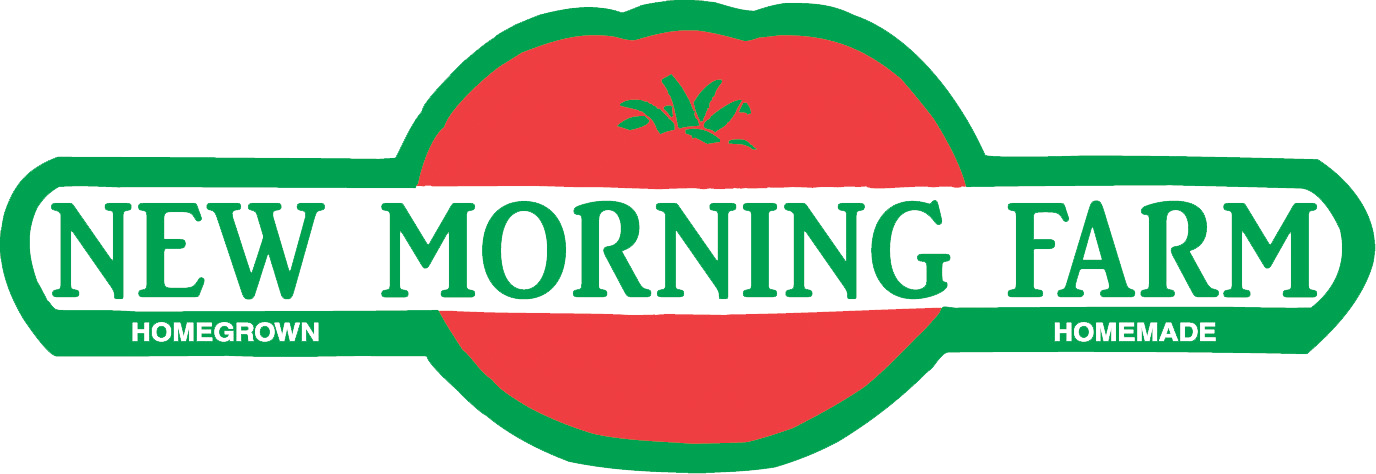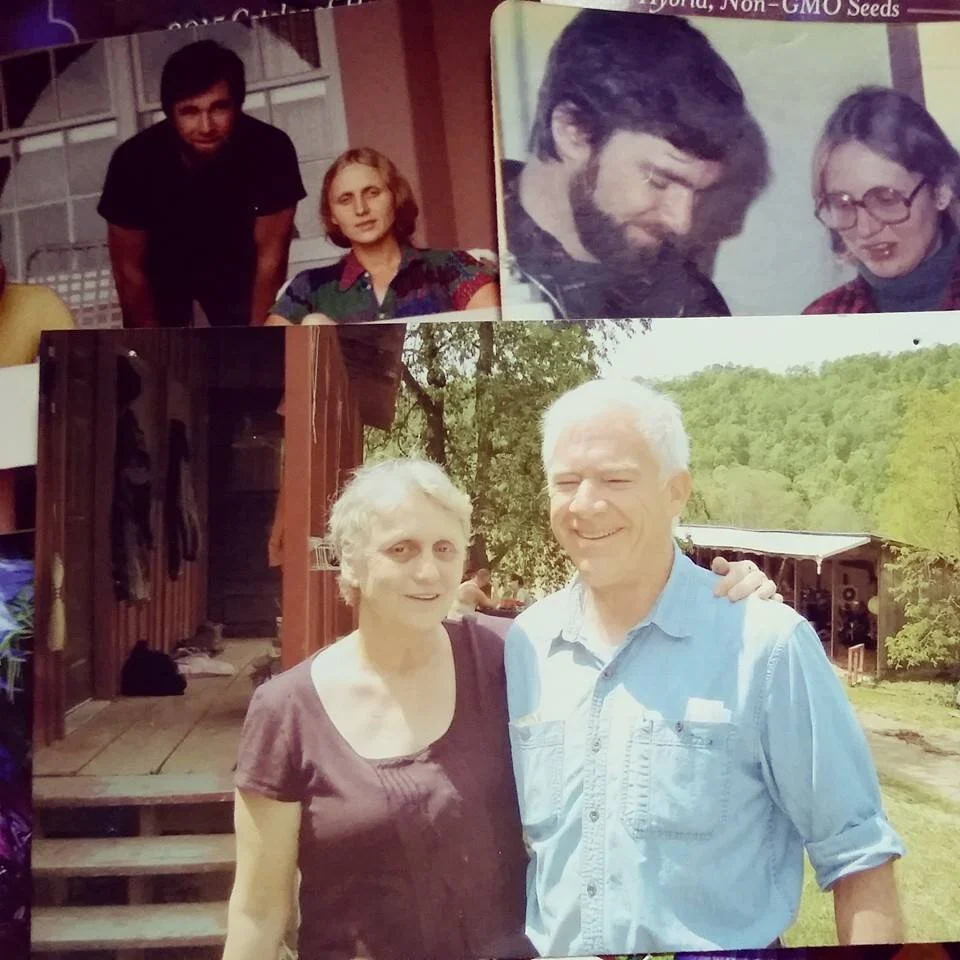Our New Morning Farm Story
Jim and Moie tell a story:
Jim: In the spring of 1972, I was living in Cleveland Park, going to law school at night and working from Capitol Hill in the anti-Vietnam War effort. On weekends, my friends and I would hang out at a little, dilapidated farmhouse we had rented in rural West Virginia.
One weekend evening, sitting around a campfire at this farm, we said to each other, if this is a real farm (we knew it wasn’t) it should have a name, and that name should come from a Bob Dylan song, the one about farms, called “New Morning”.
So this “New Morning Farm” was born, not as a serious agricultural business, but as a tongue-in-cheek thing, a weekend hangout, and everyone else was naming things after some Dylan song or other, so why shouldn’t we?
But I loved it there, because I could grow a vegetable garden, as I had done as a kid in my family’s backyard. (On this weekend “farm” we also ran around naked sometimes and smoked some of the weeds that we discovered growing in the yard. But, compared to my naked friends, I was much more serious about my garden).
When we got to the second spring of this farm rental (‘72) I started fantasizing about making a much bigger garden. In fact, I decided to take a little leave of absence from my office job, and to spend the summer doing (fully clothed) serious gardening, until law school restarted in September.
My sabbatical turned out great! I was in heaven, gardening in the country full-time, and when the dreaded September came, and I drove my pickup truck (slowly) back to my next law school class, I had an epiphany there in the parking lot. A little voice said QUIT THIS BORING STUFF. GO BACK TO THE GARDEN! And that’s what I did at that moment.
When my friends and family heard about this crazy decision everybody said, hmm. Well, it’s ok to try this for now, but keep all your options open, because you didn’t get all this education just to become a poor dirt farmer.
But I said NO! On the contrary! I’m sick of options. I’m sick of desks, books, papers, etc. I want soil, I want to work with my hands outdoors, eating fresh food I’ve grown myself, and making a living bringing this food to other people. I said: I’m gonna commit to this radically different life and figure out how to make it work, and not be poor doing it.
So I went back to the country at that moment, and started planning my vegetable farm business. Exciting! Idiotic!
While still in the city, I saw a guy, obviously from the country, in Cleveland Park selling apples from his pickup. I thought: well I’ve got a pickup. I’ve got vegetables in my garden, I’ve got neighbors in West Virginia who grow apples, and I already know the city and city people, I’ll bet better than that guy. I need to start bringing these foods to my friends in the city, and making some money!
So, in 1973 I had my first full season as a farmer, with a market (theoretically) in DC.
As 1973 ended, I was introduced by friends in DC to a nice, smart, attractive woman (AKA Moie) and she quickly agreed to come for a visit to the farm in the next spring. After that short visit, I realized I would need some help at the farm, so we decided that Moie would be on the first crew. She was willing to work, strong, and game for whatever lay ahead. So she joined me in WV and began a lifelong adventure.
From Moie: There were five inexperienced, idealistic young people on that crew. In the few years I had been out of college, I had reported for a daily newspaper and done lots of manual labor renovating a group of 19th century mill buildings in New Hampshire. Careerwise, I didn’t have much to lose if the farming failed, and I was also in love with Jim, so I dove right in to his crazy plan. I was strong and healthy and eager to work outside. This opportunity fit the bill, and the potential for bettering the world by farming organically looked tremendous. But first we had to figure out how to make it pay.
Back to Jim: By then I was quite experienced (a year of serious gardening and a year of “farming”), so I could confidently teach my new team how to be real vegetable farmers. (I thought)
Turned out I didn’t know quite as much as I had thought, and problems proliferated, with growing crops commercially (and organically.)
But the marketing in the city was a piece of cake. I had just been a city person with an office job, so not only did I understand where my customers were coming from, but I knew what they would like and how to talk their language.
Moie: I had no city experience what-so-ever, but I was game. The busy corner at 18th and Columbia in Adams Morgan was full of people from everywhere and all of their political opinions. Running the stand on that busy corner was an education.
Jim: As the above farming problems made themselves felt, I could see, when our own crops often failed, that it was lucky and good that we could bring to market good tomatoes from a neighboring farm and good apples from nearby orchards. And make a little profit to counter the losses of our lame farming efforts.
As the seasons went along, we became more realistic (i.e. poorer), and more determined to learn how to be professional growers. We did that systematically, by quizzing experienced farmers, seeking advice and training from university extension people, and most of all, by trials and (many) errors.
Marketing, on the other hand, went well. We soon acquired a great group of customers, (you!), who understood us and wanted our good foods. And many of them even invested in our business.
With our customers support, better equipment, more expertise, and a lot of dedicated employees, things gradually improved financially. By 1998, (only our 26th year!) we had reached a sweet spot from which we could say we were making a living and could possibly even afford to retire someday. Even beyond retirement, we wanted the farm and business to continue and support its own transition to the next farmer.
We started thinking seriously about retirement just a few years later. I turned 60 in 2004, and the business continued stable and profitable for quite a few years after that. I started picturing some of our best employees as successors. Several did consider the possibility, but each had a different reason to ultimately reject the offer.
Finally, in 2009, a really great prospect came to New Morning Farm as an apprentice. She had grown up on a farm (although not a vegetable farm), had just graduated from University of Vermont, she was enthusiastic, smart, astute, and serious. She could already drive a tractor! She even brought her own horse to our farm, and she totally understood how to work hard for long hours. Maybe more importantly, she loved the challenge of growing organic vegetables and selling those veggies at the markets. Just who we needed!
This person was, and is, Jennifer Glenister. In 2012 she first expressed interest in staying with us long-term, and we were thrilled. We started way back then planning how she could become the next owner, our successor.
For the next 10 years, Jenni did almost every job we have, and did all of them well. Crop Manager, crew leader, market manager, pest control manager, tractor driver, truck driver, farm manager, and on and on. She’s really demonstrated that she could eventually run the place herself.
In 2018, Jenni began her quest for financing. She had no down payment (except for her savings from working here) so she pursued some creative financing, working with both USDA and a private bank. Luckily she’s had strong support from the USDA. By now she was highly experienced, obviously capable, smart, and serious. And USDA wants to see more women running farms.
In 2019, we leased the farm and equipment to Jenni. With an operating loan from USDA, she began running the business, and officially became “operator” (title of USDA) as lessee of New Morning Farm. For the next two seasons, Jenni proved to USDA that New Morning Farm was a good risk, and set up the relationship that would allow financing to purchase the farm.
During 2020, the rest of the financing details were negotiated, and on June 9 (last week) we had closing! So, in her third season as operator, and 13th season on the farm, Jenni became Owner and Operator!
Moie: It may not be evident to all of you, but the transfer of this farm to Jenni is historic. It is unusual for a farm to be sold intact, with plans to keep operating as it has for years, and to have such knowledgeable and capable new leadership. Because Jenni and Jim persisted over multiple seasons to negotiate and fine-tune the ownership transfer, this farm will not stop operating when we retire. I feel especially fortunate to be taken care of, but everyone wins in this situation—we, Jenni and you. Thank you for supporting NMF for so long.
Jim: So what does all this mean for you, the valued, loyal customer? Not much at all! From your view, things won’t change in this, our 50th year of operation. Jenni is fully committed to our cropping and marketing systems. She is enthusiastic about maintaining our values and our culture as an organization. She has trained herself as thoroughly as imaginable in every aspect of our operations.
Many of you already know Jenni. For more than a decade, she has been a friendly, cheerful, efficient member (or manager) of the market crews at all of our three market locations. I strongly urge you to get to know her. You’ll be glad you did!
What, you may wonder, will happen to us, Moie and me? Are we “going gentle into that good night” of old farmers? Will you stop seeing and hearing Jim at market? NO! You won’t! We continue as farm employees! Moie retired years ago from her marketing work, but she has some hours of tasks still on her agenda at the farm. Jim will continue to see you and holler at you at the Sheridan Saturday Market, and he has a day or two of other management work to do at the farm.
No, Moie and I don’t want to stop completely, even long-term, as long as we can do what we do now. We enjoy staying involved, living in our house at the farm, and Jim, especially, hopes never to stop seeing all of you at market. He is healthy (all those organic vegetables!), and he still believes in, and gets pleasure from, seeing you and encouraging you to enjoy our good foods.
Looking forward to our future, and the farm’s under Jenni’s leadership, and with huge gratitude for your many years of loyal support,
Sincerely,
Jim and Moie


